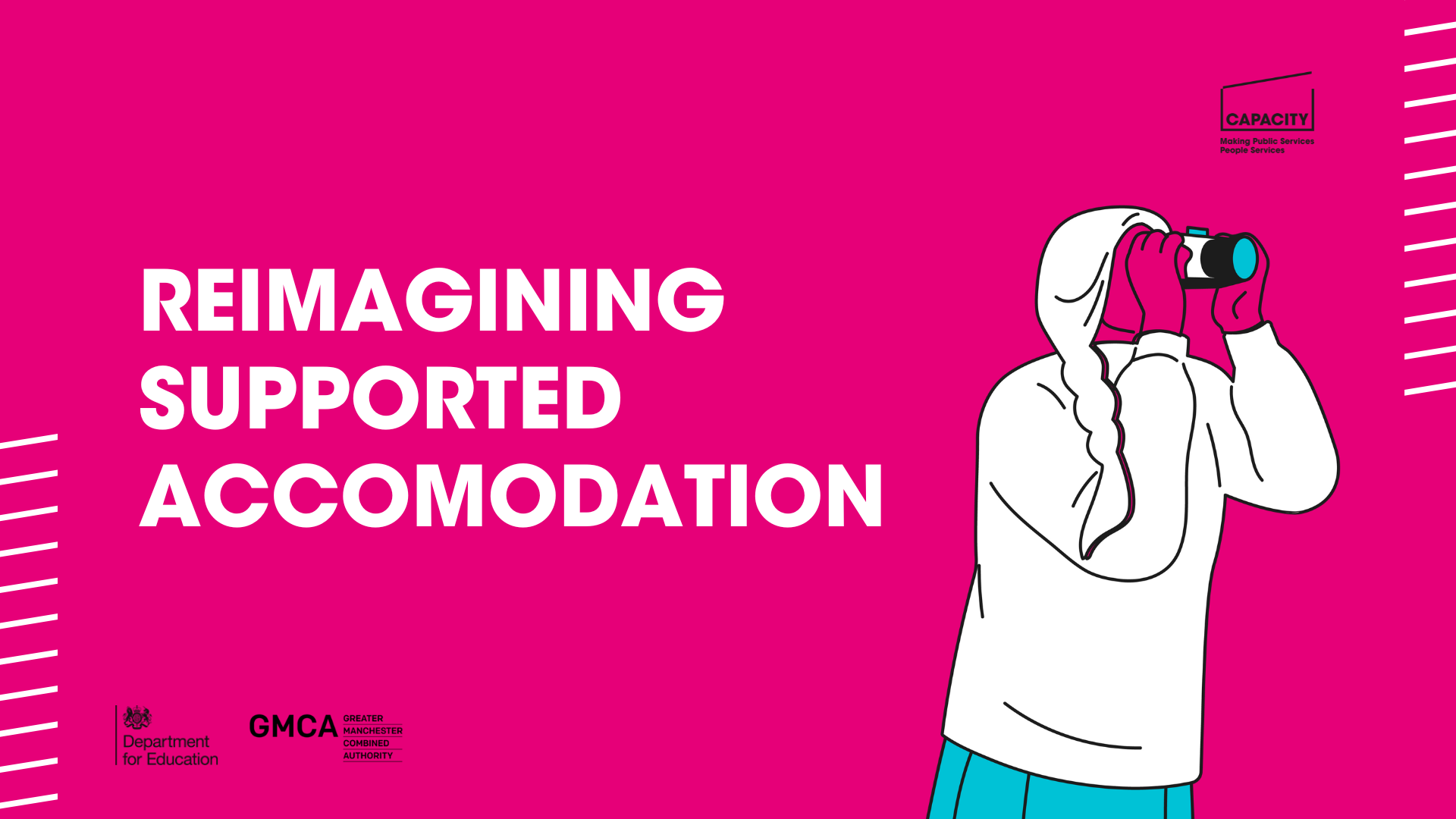In Greater Manchester, the RCC provides resource and capacity to think – and do – things differently. Regional pathfinders are central to reforms in children’s social care. In 2024, Capacity was commissioned to complete two pieces of work for the RCC – one to build a case for change for young people with complex needs, and one to reimagine how supported accommodation is provided in Greater Manchester.
A bit of background
Young people leaving care experience extraordinary challenges. Getting their next accommodation steps right can be crucial to their move into adulthood.
Many care leavers end up in unsuitable accommodation due to a variety of reasons, leading to poor outcomes in later life. Statistics show that those who have been in local authority care generally experience poorer outcomes than their peers. They are less likely to be in education, employment or training, and more likely to experience housing insecurity and homelessness.
Due to a range of factors, there is a scarcity of suitable accommodation and support for people leaving care. Resource restrictions, a constrained housing market and an increase in the complexity of need amongst these young people all contribute to this scarcity.
Sometimes known as semi-independent accommodation, supported accommodation describes a broad range of homes where young people live more independently than they typically would in residential homes or foster placements. When done well, supported accommodation can be a place where young people feel supported and empowered, developing their independence as they prepare to leave care and start adult life.
In Greater Manchester, there is currently an over-supply of supported accommodation. Of all provision for children and young people in the region, supported accommodation has grown the fastest in recent years. The problem is, the quality of this accommodation is variable, and there are concerns around its safety and stability.
It’s against this backdrop that, in mid-2024, the RCC approached Capacity with a challenge. They wanted our help to develop and improve their supported accommodation provision for young people in local authority care in the region aged 16 and 17. To do this, they tasked us with undertaking a detailed feasibility study, seeking to understand the challenges and opportunities in Greater Manchester and exploring a new approach to providing purpose-driven supported accommodation that meets the needs of local young people.


What we heard
Between July and November 2024, we set out to build a better understanding of the challenge at hand.
We reviewed the existing data, undertaking desktop research and familiarising ourselves with local authority sufficiency strategies to get to grips with the current picture in Greater Manchester. Then, it was time to listen to a range of perspectives. We engaged with purpose-driven providers, local authority leaders and care-experienced young people from across Greater Manchester (and beyond).
While young people were clear that supported accommodation plays a vital role in their journey into adulthood, many reported negative experiences they’d had including having to move and having to live with people who made them feel unsafe. A key issue was the lack of suitable accommodation and choice. Young people described feeling isolated and cut off from their birth families, professionals and wider support networks.
Providers and local authorities told us that a historic lack of regulation has led to cynicism around the ethics and purpose of supported accommodation. While there are a number of purpose-driven community, voluntary and for-profit providers in Greater Manchester, a lack of consistent quality assurance mechanisms makes it hard for them to understand their impact, preventing positive stories about supported accommodation from being told. These purpose-driven organisations told us that they need support across a range of areas, from business advice, workforce development and accessing finance to enable them to navigate the complexity of the market and produce better outcomes for the young people they support.
‘You don’t get any choice on where you live, and then you only have one chance to mess up’.
– Care-experienced young person
Creating a blueprint
We identified 4 key areas of work emerging from the insight:
- Respond to the negative perceptions of supported accommodation.
- Take concerted action to drive up quality, with a focus on outcomes.
- Identify, support and incubate purpose-driven providers.
- Promote ‘interdependence’, not just ‘independence’ for care leavers.
Based on these areas, we developed a blueprint that will provide the RCC with recommendations for next steps to take the work forward. A report outlining these recommendations will be shared in 2025.
So, what’s next?
We’re looking forward to sharing our insight and recommendations with the RCC. While the work is still in its early stages, we hope it creates a clearer roadmap for tackling some of the underlying issues in the supported accommodation sector, so young people are better supported as they leave care and have a smoother transition into adulthood.


